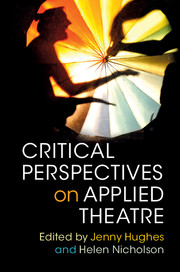Book contents
- Frontmatter
- Contents
- List of figures
- List of contributors
- 1 Applied theatre: ecology of practices
- PART I HISTORIES AND CULTURAL MEMORIES
- PART II PLACE, COMMUNITY AND ENVIRONMENT
- PART III POETICS AND PARTICIPATION
- 10 Applied theatre and participation in the ‘new’ South Africa: a possible politics
- 11 Staging Labour Rights
- 12 The micro-political and the socio-structural in applied theatre with homeless youth
- 13 A good day out: applied theatre, relationality and participation
- Notes
- Index
- References
11 - Staging Labour Rights
from PART III - POETICS AND PARTICIPATION
Published online by Cambridge University Press: 05 April 2016
- Frontmatter
- Contents
- List of figures
- List of contributors
- 1 Applied theatre: ecology of practices
- PART I HISTORIES AND CULTURAL MEMORIES
- PART II PLACE, COMMUNITY AND ENVIRONMENT
- PART III POETICS AND PARTICIPATION
- 10 Applied theatre and participation in the ‘new’ South Africa: a possible politics
- 11 Staging Labour Rights
- 12 The micro-political and the socio-structural in applied theatre with homeless youth
- 13 A good day out: applied theatre, relationality and participation
- Notes
- Index
- References
Summary
This chapter presents a political and poetic inquiry into performance's relationship to the existential ubiquity of labour, examined here through an exploration of the staging of a public performance. The intersections of affect, materiality, beauty, and futurity are discussed as theoretical reference points in staging labour as an activist performance that offers alternative narratives and imaginings for what it means and how it feels to labour.
I will pause here to enumerate how I am defining labour. My aim is not to be complete or definitive but descriptive and generative of labour's many manifestations. First, to clarify the distinction between ‘labour’ and ‘work’: by labour I mean work and the nature, ontology, philosophy, and politics of work as well as work's metaphorical, poetic, and symbolic imaginings; the work of the brain and body constitute the infinite temporalities, materiality, and power dynamics of labour. Second, to clarify the distinction between ‘a job’ and ‘labour’: labour both entails and exceeds ‘a job’; by labour I mean both a job and its resonances in working in/on a job, that is something that one must get done with and for others including the job's emotional affects, material structures, shared context and belonging that give it form – a space to work – and make our choice to have and access to a job a human right. Third, labour includes the physicality and procedures of the job and the ontology of work entailed, while expanding the discourses about these physicalities and procedures as well as their possible futures. Labour becomes the overarching rubric across the domains of the job and the work that the job demands – labour encompasses the felt-sensing experiences, histories, and symbology of job and work. Fourth, labour includes the future and imagining the utopic (the here, the now, in this place, in an everywhere, or a nowhere place) to guide and inspire formations of freedom and the actions required to attain those formations; labour encompasses a great effort – work and working a job – and imaging a new materiality, that is a plausible or realizable future.
The question becomes: How are these descriptions of labour and their implications staged relative to the day-to-day actions of our lives, both locally and globally? What do these descriptions look like in performance? How do we access those defining stories that labour generates?
- Type
- Chapter
- Information
- Critical Perspectives on Applied Theatre , pp. 212 - 228Publisher: Cambridge University PressPrint publication year: 2016
References
- 1
- Cited by



